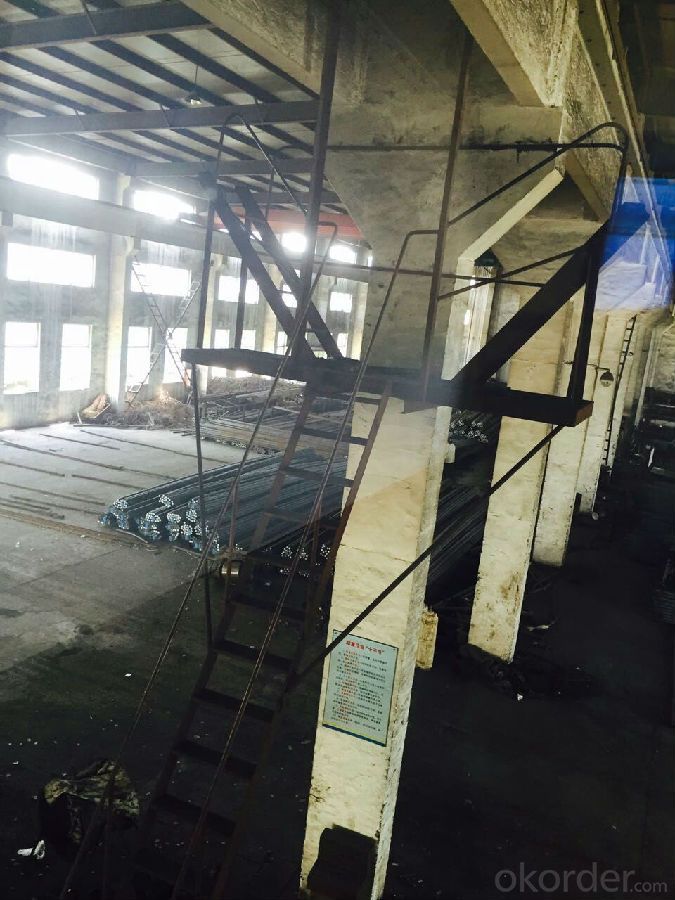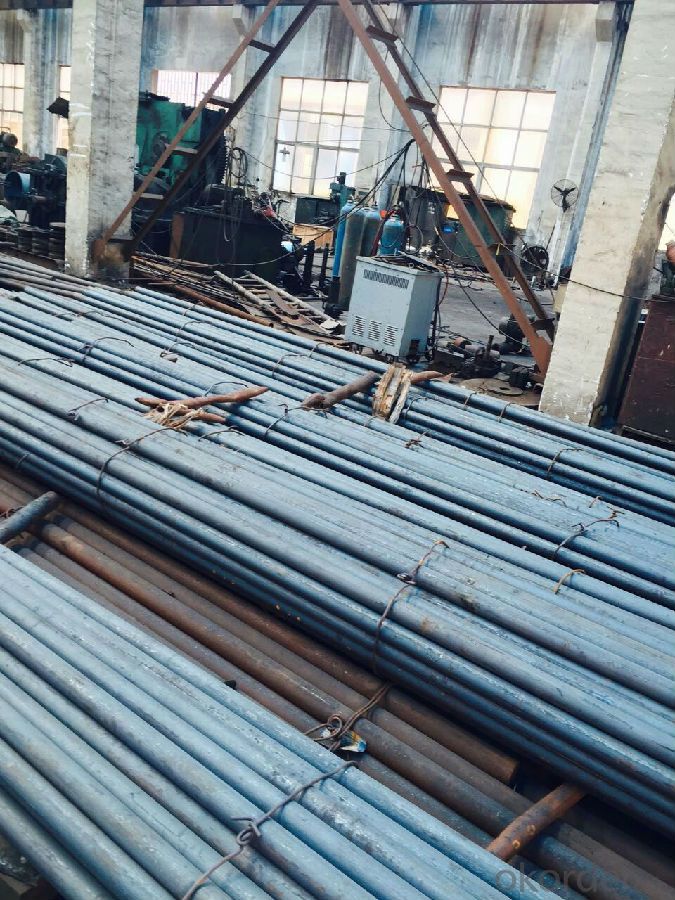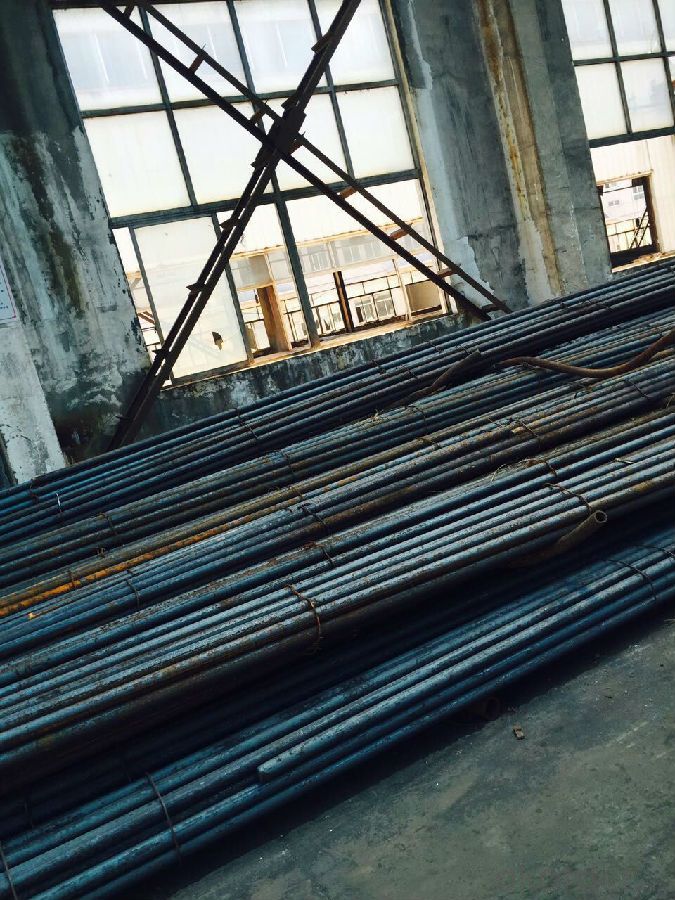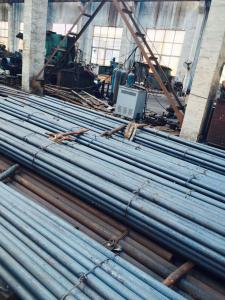1045 Cold Drawn Steel Round Bar
- Loading Port:
- Tianjin
- Payment Terms:
- TT OR LC
- Min Order Qty:
- 25 m.t.
- Supply Capability:
- 50000 m.t./month
OKorder Service Pledge
OKorder Financial Service
You Might Also Like
Item specifice
1045 Cold Drawn Steel Round Bar
Product Details:
1.Standards: AISI:1045/ASTM:1045/JIS:S45C/DIN:1.0503/GB45/En8/CK45/XC45/C45
2.Round sizes: Dia 80-500mm Length 2500-5800mm or as your request.
3.Factory condition:Annealed to HBS<220;hot rolled,black.
4.Test:Ultrasonic test according to SEP 1921
5.Packing situation: standard seaworthy packing or as customer required
6.Delivery time: 20 days after order confirmed
7.Payment: T/T or L/C at sight.
Chemical composition:
C | Si | Cr | Mn | Ni | P | S | Cu |
0.42-0.55 | 0.17-0.35 | ≤0.022 | 0.50-0.75 | ≤0.012 | ≤0.018 | ≤0.01 | ≤0.017 |
Application:
Plain carbon steel for mechanical engineering and automotive components.
It is usually supplied untreated but can be supplied to order in the normalized or finally heat treated (quenched and tempered to "Q" or "R" properties), which is adequate for a wide range of applications.
It is a very popular grade of through-hardening medium carbon steel, which is readily machinable in any condition. It is suitable for the manufacture of parts such as general-purpose axles and shafts, gears, bolts and studs. It can be further surface-hardened typically to 50-55 HRC by induction processes, producing components with enhanced wear resistance.
In its heat treated forms possesses good homogenous metallurgical structures, giving consistent machining properties.
Product Show:



- Q:How is the toughness of special steel measured?
- The toughness of special steel can be assessed by specific tests and methodologies that evaluate its capacity to absorb energy and withstand fractures. One widely used approach is the Charpy V-Notch (CVN) test, in which a notched specimen is struck by a pendulum hammer, and the energy absorbed during fracture is measured. The results are then expressed as the energy absorbed per unit area, typically in joules per square centimeter (J/cm²) or foot-pounds per square inch (ft-lb/in²). Another commonly employed test is the Izod test, which is similar to the CVN test but involves a different specimen geometry. Furthermore, engineers and manufacturers may also employ other mechanical tests such as tensile strength, impact strength, and fracture toughness measurements to evaluate the toughness of special steel. These tests are invaluable in determining the suitability of special steel for various applications, particularly those requiring exceptional resistance to impact or sudden loading.
- Q:What are the different surface treatments applied to special steel?
- The different surface treatments applied to special steel include galvanizing, electroplating, powder coating, painting, passivation, nitriding, and heat treatment. These treatments are used to enhance the corrosion resistance, hardness, and aesthetics of the steel, depending on the specific application requirements.
- Q:How is high-temperature tool steel used in the production of hot work tools?
- High-temperature tool steel is used in the production of hot work tools due to its exceptional heat resistance and strength properties. It can withstand the high temperatures generated during hot work processes such as forging, extrusion, and die casting, without losing its hardness or experiencing deformation. This steel is used to manufacture tooling components like dies, punches, and inserts, ensuring their longevity and performance in extreme heat conditions.
- Q:What are the different case hardening grades of special steel?
- Special steel offers a variety of case hardening grades, each with its own distinct properties and uses. Some of the commonly employed grades are: 1. 8620: This grade is commonly utilized for high-stress applications like gears and shafts. Its remarkable toughness and resistance to wear make it ideal for parts requiring both durability and strength. 2. 9310: Aerospace applications often rely on this grade due to its high strength and resistance to fatigue. It is frequently employed for gears, bearings, and components demanding exceptional toughness and load-carrying capacity. 3. 4340: Known for its hardenability and high strength, this grade is suitable for parts necessitating great tensile strength and impact resistance, such as crankshafts, connecting rods, and gears. 4. 20MnCr5: This grade finds frequent use in the production of gears, camshafts, and components requiring high surface hardness and resistance to wear. It boasts excellent case-hardening properties and good core strength. 5. EN36C (also referred to as 655M13): This grade is commonly employed for axles, shafts, and crankshafts requiring high tensile strength. Its good hardenability and exceptional toughness make it suitable for heavy-duty applications. To ensure the right grade is chosen for a specific project, it is crucial to consider the application requirements, including desired hardness, strength, and wear resistance. Seeking advice from a metallurgist or materials science expert can aid in selecting the appropriate case hardening grade.
- Q:What are the safety benefits of using special steel?
- Using special steel can provide several safety benefits in various applications. One of the main advantages is its enhanced strength and durability compared to traditional steel. Special steel is often designed to withstand extreme conditions, such as high temperatures or corrosive environments, making it ideal for applications in industries like aerospace, automotive, and oil and gas. The high strength of special steel allows for the construction of safer and more reliable structures. It can withstand heavy loads, reducing the risk of structural failures or collapses. This is crucial in industries where the safety of workers, equipment, and the general public is of utmost importance. Another safety benefit of special steel is its resistance to corrosion. Corrosion can weaken structures and compromise their safety. Special steel is often alloyed with elements like chromium, nickel, or molybdenum, which provide excellent corrosion resistance. This makes it suitable for applications in marine environments, chemical processing plants, or any setting where exposure to moisture or chemicals is a concern. Special steel is also known for its ability to retain its mechanical properties at high temperatures. This makes it an excellent choice for applications where heat resistance is crucial, such as in the construction of fire-resistant structures or in the manufacturing of industrial ovens and furnaces. By using special steel in these applications, the risk of structural failure or fire-related accidents can be significantly reduced. Furthermore, special steel can offer improved fatigue resistance, which is important in applications subject to cyclic loading or vibration. Fatigue failure can occur when a material experiences repeated stress over time, leading to cracks and eventual failure. Special steel can be engineered to have excellent fatigue properties, reducing the likelihood of unexpected failures and improving the overall safety of structures or equipment. In summary, the safety benefits of using special steel include enhanced strength, durability, corrosion resistance, heat resistance, and fatigue resistance. These properties make special steel a reliable choice for industries where safety is a top priority, ensuring the protection of workers, equipment, and the general public.
- Q:How does special steel contribute to the defense machinery industry?
- Special steel contributes to the defense machinery industry by providing superior strength, durability, and resistance to corrosion. This type of steel is specifically designed to meet the demanding requirements of military applications, ensuring that defense machinery can withstand harsh environments, extreme temperatures, and heavy use. By utilizing special steel, the defense industry can produce high-performance weapons, vehicles, and equipment that are essential for national security and defense capabilities.
- Q:What are the unique properties of stainless steel?
- Stainless steel possesses several unique properties that set it apart from other metals. Firstly, it is highly corrosion resistant, making it ideal for applications in environments with high moisture or chemical exposure. Secondly, stainless steel has excellent strength and durability, allowing it to withstand extreme temperatures and heavy loads. Additionally, it is hygienic and easy to clean, making it popular in industries such as food processing and medical equipment. Lastly, stainless steel is aesthetically pleasing, with a shiny and polished appearance that can be maintained over time.
- Q:Can special steel be used in the appliance manufacturing industry?
- Yes, special steel can be used in the appliance manufacturing industry. Special steel, also known as alloy steel, offers enhanced properties such as durability, corrosion resistance, and high temperature resistance. These qualities make it suitable for various appliance components, including heating elements, motor shafts, and structural parts.
- Q:How does special steel ensure dimensional stability?
- Special steel ensures dimensional stability through a combination of factors such as controlled composition, precise heat treatment, and careful manufacturing processes. The specific composition of special steel is designed to have a lower coefficient of thermal expansion, which means it expands and contracts less with changes in temperature compared to regular steel. This ensures that the dimensions of the steel remain stable even under varying temperature conditions. Additionally, the heat treatment process further enhances the dimensional stability by refining the microstructure and reducing internal stresses. The careful manufacturing processes, including precise machining and quality control, also contribute to maintaining dimensional stability in special steel products.
- Q:Can special steel be used in the railway industry?
- Yes, special steel can be and is commonly used in the railway industry. Special steel alloys such as manganese steel, stainless steel, and wear-resistant steel are often utilized in the manufacturing of railway tracks, wheels, axles, and other components. These special steel materials offer enhanced strength, durability, and resistance to corrosion and wear, making them ideal for withstanding the heavy loads, frequent use, and harsh environmental conditions experienced in the railway industry.
1. Manufacturer Overview |
|
|---|---|
| Location | |
| Year Established | |
| Annual Output Value | |
| Main Markets | |
| Company Certifications | |
2. Manufacturer Certificates |
|
|---|---|
| a) Certification Name | |
| Range | |
| Reference | |
| Validity Period | |
3. Manufacturer Capability |
|
|---|---|
| a)Trade Capacity | |
| Nearest Port | |
| Export Percentage | |
| No.of Employees in Trade Department | |
| Language Spoken: | |
| b)Factory Information | |
| Factory Size: | |
| No. of Production Lines | |
| Contract Manufacturing | |
| Product Price Range | |
Send your message to us
1045 Cold Drawn Steel Round Bar
- Loading Port:
- Tianjin
- Payment Terms:
- TT OR LC
- Min Order Qty:
- 25 m.t.
- Supply Capability:
- 50000 m.t./month
OKorder Service Pledge
OKorder Financial Service
Similar products
New products
Hot products
Related keywords





























